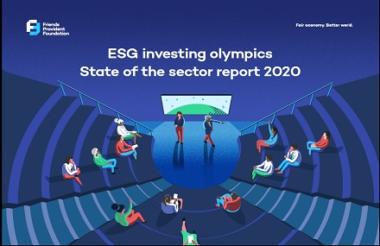The investment management sector lacks true in-house expertise around environment, social and governance (ESG), a report by three charitable investors has found.
The ESG Investing Olympics - State of the Sector Report was published yesterday, and also urges the sector to focus more on social issues.
The Friends Provident Foundation, the Joffe Charitable Trust and the Blagrave Trust launched the ESG investing Olympics in January 2020, inviting fund managers to put forward proposals for managing an investment portfolio with social and environmental impact.
The three charities contributed a combined £33.5m to an investment mandate for the winning firm, which was Cazenove Capital.
A lack of expertise
The report says that the “weakest proposals” came from firms that had no in-house ESG expertise and relied on third-party ESG indices.
However, fault was also found with some firms that did claim to have in-house expertise.
“Most of the proposals we received claimed to have some in-house ESG expertise, but upon reading team bios few of them did, especially on environmental and social (E&S) issues,” the report says. “Many had experience of charity client relationship management, but very few had specialist E&S qualifications or experience with NGOs, academia, business, finance or government. Some cited occasional training days as evidence of an ESG knowledge base.”
This lack of knowledge was also found in some firms that had internal processes to integrate ESG into investment decision-making. The report questions how meaningful these processes can be without in-house expertise.
A lack of ‘S’
One common theme found was that most firms put more focus on the environmental and governance issues, leading to a lack of attention to social issues.
“Recent events, such as the global pandemic and BLM movement, should put the ‘S of ESG’ firmly on the agenda,” the report says. “Key social issues, from decent work and conditions to workforce and management diversity to aggressive tax avoidance, are going to require far greater attention and integration.”
Voting, engagement and exclusion
When it came to shareholder voting the report says that there was wide range of approaches, with the worse example being the “non-disclosure of voting record and outsourcing of voting with no accompanying ESG policy or instructions.”
On shareholder engagement, many of the proposals’ examples were limited to letter writing or meeting, with “too many” relying on third party collective engagement initiatives.
The “S of ESG” was found lacking again when it came to exclusions. Most of the entries excluded fossil fuel investments but beyond this, the report says, “most only specifically excluded traditional ethical issues such as tobacco, armaments and gambling.”
However, speaking at an event to launch the report, Colin Baines, investment engagement manager at the Friends Provident Foundation, said the exclusion of fossil fuels was one of the “most improved” areas in recent years. He said it had been a source of conflict between mission-led investors and the investment management industry in the past.
He added that despite this the engagement versus exclusion argument is often “disingenuous” as many managers are “not doing anything meaningful” in terms of engagement or wider exclusion.
Reporting and recommendations
Purposeful impact funds, especially from “boutique high-impact managers”, provided the best impact reporting, the report says.
It adds: “Most asset managers acknowledged that there was still much work to do on impact reporting, and current practice is often inadequate.”
In order to improve on these areas of concern, the report makes five recommendations “to address the most basic and serious gaps”:
- A presumption to vote in favour of ESG resolutions, taking a “comply or explain” approach.
- Active ESG engagement that goes further than disclosure or distant targets to effect real change in the near term.
- Engagement escalation policy.
- Integration of the “S of ESG” into stock selection and shareholder engagement.
- Regular disclosure of all holdings, voting record and engagement activity.
New fund
At the same time as the report was launched, Cazenove Capital also launched its a new Sustainable Growth Fund available to its charity and private clients, which the three foundations behind the ESG investing Olympics are the seed investors of.
“Using Schroders' latest sustainability analytics, we are able to quantify the fund’s impact and will push for progress, using our influence to drive change,” Kate Rogers, co-head of charities at Cazenove Capital. “We estimate that companies within the portfolio at launch generate less than half of the carbon emissions, and four times the social benefit, of companies in a global equity index.”












